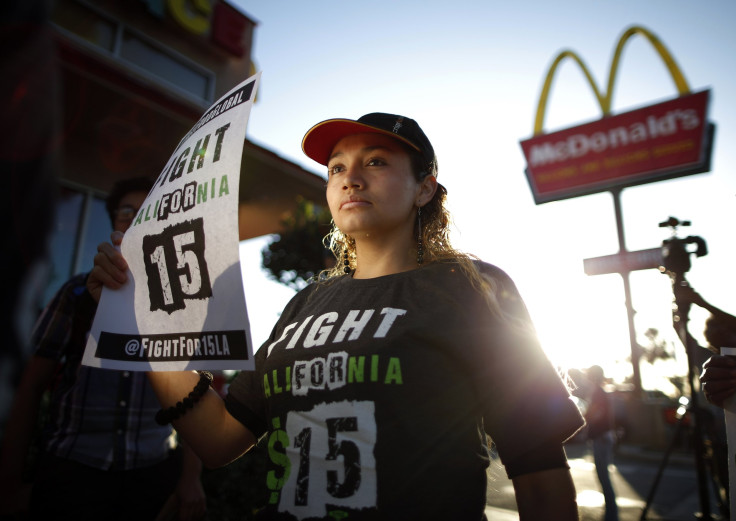Minimum Wage And Fast-Food Workers: Now, ‘Fight For $15’ Organizers Want To Join A Union, Too

One of America's biggest unions is now dealing with an in-house labor protest of its own. A small group of organizers for Fight for $15 — the nationwide campaign advocating a fast-food workers' union and a $15 minimum wage — are demanding the right to join the staff union of the Service Employees International Union, the labor group behind the $15 campaign.
Staff representation is often a contentious issue for major labor unions. As organized labor has declined nationwide and union coffers have dried up, many labor organizations have found themselves struggling to make the most of dwindling resources. This can put union leadership at odds with their staff, especially if that staff demand the same protections and working standards that union members enjoy.
In some cases, union employees may form a union of their own. That's how the Union for Union Representatives, a group representing approximately 100 SEIU staff members nationwide, came about. Now the UUR is insisting that organizers with the Fight for $15 campaign should also be unionized — and that the SEIU has violated its own staff's collective bargaining contract by not letting Fight for $15 workers join UUR.
Although the SEIU has sometimes described Fight for $15 as a semi-autonomous entity, distinct from the union itself, the UUR says workers affiliated with the campaign are effectively SEIU employees. As such, they should have representation of their own, said the UUR in a statement Monday. Fifteen organizers with Fight for $15 have signed UUR membership cards, but a UUR representative estimated that there are roughly 100 organizers who should be covered by the UUR's contract with the SEIU.
"We are strong believers in the work of the Fight for $15 campaign. Our members work side by side with non-union staff who are on the front lines of this campaign," said UUR president Conor Hanlon in the statement. "Why, then, should Fight for $15 staff not be part of our union?"
It's an awkward question for the SEIU and Fight for $15, which often accuse other companies of misclassifying workers in order to shirk their responsibility for fair pay and working conditions. As part of its efforts to organize fast-food workers, Fight for $15 has organized lawsuits against McDonald's, saying the huge chain shares responsibility for labor law violations allegedly committed by some of its franchisees.
California Fight for $15 organizer Emiliana Sparaco told International Business Times she and her colleagues were "in the same position" as the fast-food workers they're trying to organize: overworked, underpaid and precariously employed. Despite being one of just two organizers assigned to the entire fast food campaign in San Diego, Sparaco said she makes approximately $34,000 per year without overtime.
"I'm asking workers to take a risk, I'm asking them to challenge the fact that they're being exploited," she said of her job. "And I feel like it would only be right for me to do the same thing, because I'm in the same position that they're in."
The SEIU did not return a request for comment. UUR issued its demand for unionization of Fight for $15 employees during the SEIU's 2016 national convention in Detroit. While at the convention, SEIU president Mary Kay Henry told Buzzfeed that workers organized under the Fight for $15 would soon vote on whether to formally affiliate with the union.
Last year, the SEIU spent approximately $16 million on organizing campaigns like Fight for $15, according to tax filings.
Though assigned to the Fight for $15 campaign, Sparaco told IBT she had been hired by the SEIU, and someone from the union was her direct supervisor.
"The only thing that keeps me from being an SEIU staffer myself is that my paycheck has another name on it," she said.
© Copyright IBTimes 2025. All rights reserved.






















